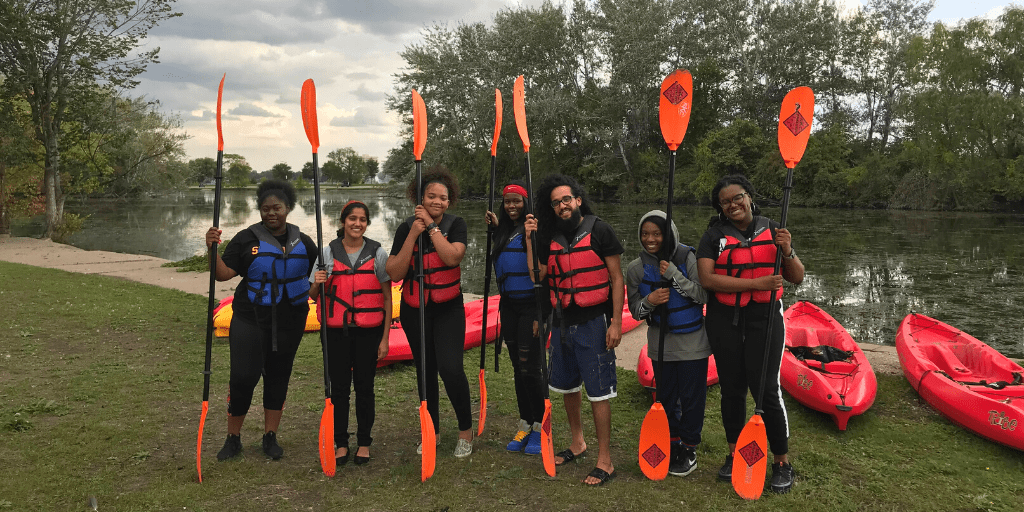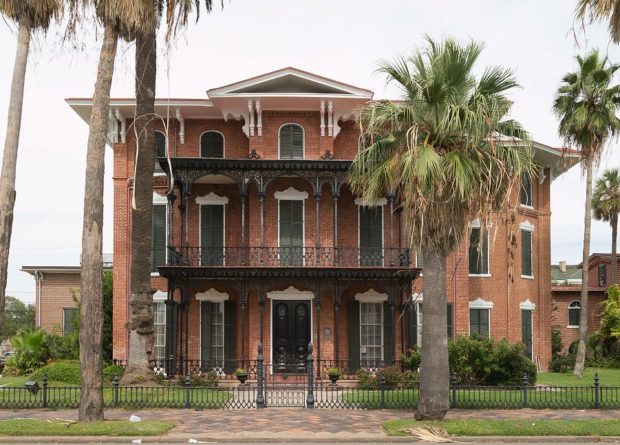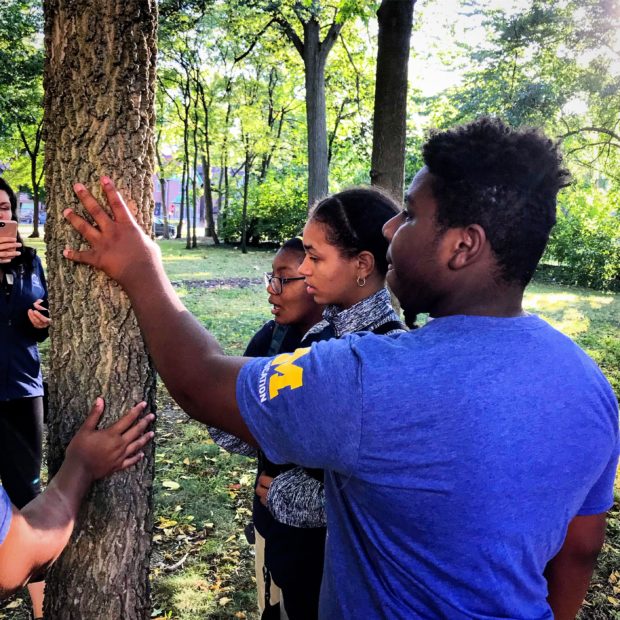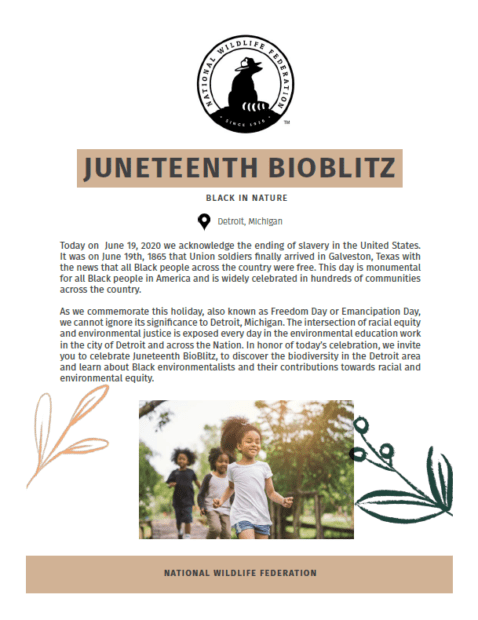We have much more to do and your continued support is needed now more than ever.
Juneteenth: A Celebration of Freedom

A Reminder to Continue the Fight For Environmental Equity
Racial justice and environmental justice are intrinsically linked, and we will not reach the vision of healthier habitats and communities without addressing this connection and its impact.
Juneteenth
Today, on June 19, 2020, we acknowledge the ending of slavery in the United States. It was on June 19, 1865, two and a half years after the Emancipation Proclamation was issued, that Union soldiers finally arrived in Galveston, Texas with the news that all Black people across the country were free.
This day is monumental for all Black people in America and is widely celebrated in hundreds of communities across the country. By learning about the history of Juneteenth, we can better understand the importance of inclusion in the outdoors, with equitable community events like the Detroit BioBlitz.

As we commemorate Juneteenth, also known as Freedom Day or Emancipation Day, we cannot ignore its significance to Detroit, Michigan. We also take time to remember, educate and reflect on key events such as the Blackburn Riots and the countless Black abolitionists in Detroit such as George DeBaptiste, William Webb, Tabitha Lightfoot, Caroline French, Rutha Blackburn, Thornton Blackburn who led thousands of enslaved African Americans to freedom. It was Detroit’s very own congresswomen, Barbara-Rose Collins, who introduced a bill in 1996 that petitioned the U.S. government to make Juneteenth a federal holiday. Collins said, “The dehumanizing and degrading conditions of slavery were unnecessarily prolonged for hundreds of thousands of Black men, women, and children because our American government failed to communicate the truth.”
Racial justice and environmental justice are intrinsically linked, and we will not reach the vision of healthier habitats and communities without addressing this connection and its impact. Dr. Mustafa Santiago Ali, vice president of environmental justice, climate, and community revitalization at National Wildlife Federation, says,
“To create environmentally just policies, conservation organizations like the National Wildlife Federation and legislators must first acknowledge the disproportionate impact that climate change and pollution have on lower-income and Black and Brown communities compared to wealthier and predominantly white communities.”
It’s through this work that we urge that everyone will be bold, speak up, read up, learn, un-learn, act, donate, support and join Black people in order to end this culture of racial oppression and strive to embed equity and justice throughout or work, relationships and lives for centuries to come.
#JuneteenthBioBlitz
In honor of today’s celebration, we invite you to celebrate Detroit’s Juneteenth BioBlitz, and discover the biodiversity in the Detroit area and learn about Black environmentalists and their contributions towards racial and environmental equity.
The goal of the #JuneteenthBioBlitz is to recognize the resilience, tenacity, and strength of our natural environment and the Black people who have stewarded our land for generations. During the hundred years following the first Juneteenth, when Black people were celebrating, they were prohibited to use public land for festivities and gatherings, because of segregationist laws and customs. These events were then held in rural areas near rivers and creeks where there were more opportunities for outdoor recreation such as fishing, horseback riding, and barbecuing. Eventually, as African Americans bought up property, they began dedicating their land to Juneteenth. One of the early land purchases and fundraisers was organized by Reverend Jack Yates which became Emancipation Park in Houston, Texas in 1898.
In 2020, we are witnessing the world fight to end widespread systemic injustices, police violence, and racism. In response, our National Wildlife Federation Great Lakes Habitat and Education team stands in solidarity with Black lives, Black joy, Black ideas, and Black healing. Through our habitat and education programming (Sacred Grounds, Detroit Leadership Environmental Education Program) in Detroit we hope to continue cultivating relationships and solutions centered in equity, inclusion, justice, solidarity, and resilience.
Celebrate Juneteenth by participating in Juneteenth BioBlitz in Detroit.
What is a BioBlitz?
A BioBlitz is an intense period of biodiversity surveying open to all ages that aims to record all the living species within a designated area. The goal of most BioBlitzes is to get communities interested in their local biodiversity.

We encourage you to take some time today to explore your own backyard, local park, front lawn, and/or garden big or small and find living organisms that exist nearby. Additionally, we hope you’re able to take some time to reflect on the Black environmental heroes who have and continue to shape the way we see the natural world today. While you’re enjoying and reflecting, take a picture, and share some of the fascinating plants and wildlife you see! Share your photo on your social media feed using the hashtags (below). We’d love to see what you find!
- #JuneteenthBioBlitz
- #DetroitBioBlitz
- #BlackinNature
Safety Guidelines & Tips
The National Wildlife Federation advises following the latest government and local policies regarding coronavirus (COVID-19). Follow your state’s mandated guidelines for area specific updates concerning outdoor activity and remember a BioBlitz can be done individually or with your family. Please find your state or territorial health department here.






















